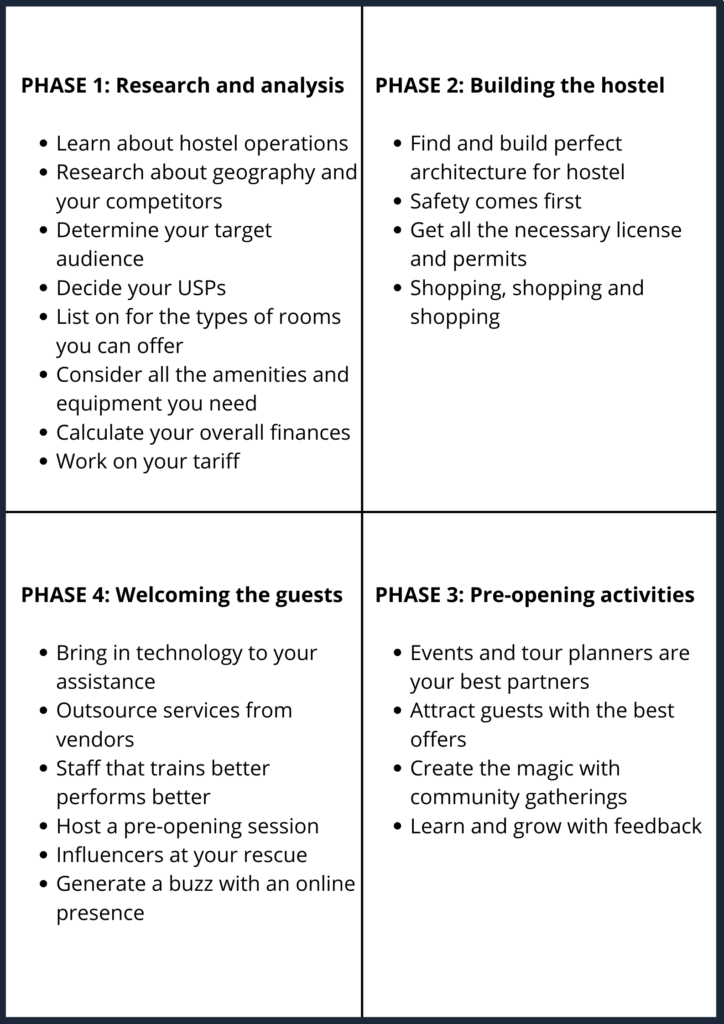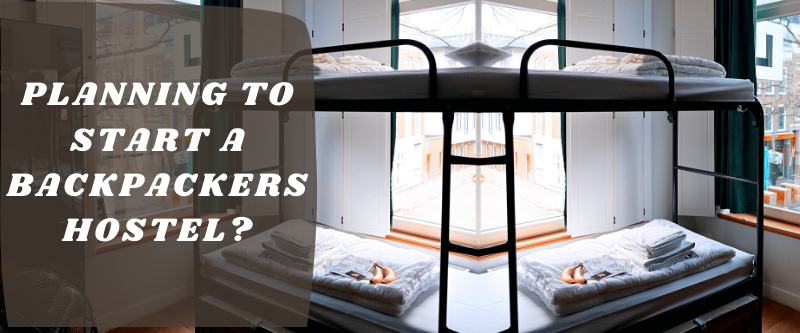To start a business one should have concrete knowledge, understanding and expertise. Well, hostels are no different.
Opening a hostel is not as easy as it seems to be. And, most of them are often stuck on one question – How to start a backpackers hostel?
So, if you are on the same page, here’s a step-by-step guide for you to start a backpackers hostel.
Table of Content
How did the concept of hostels originate?
This concept came into existence in 1912 when a German teacher Richard Schirrmann established the first hostel in Altena (Germany) in a school building.
The idea was to provide young explorers a place to stay. With an influx of travellers the hostel was soon relocated to the Castle of Altena.
Later in 1932, the International Youth Hostel Federation came into existence appointing Richard Schirrmann as its first president which was then renamed as Hostelling International (HI) in 2006.
Since then, HI is welcoming guests from across the world to stay at their hostels. Their core mission is to serve every traveller looking for accommodation, without discriminating against them on the grounds of their nationality, caste, gender, or ethnicity.

These days, hostels focus on providing guests with an excellent experience. They offer an appealing decor, gaming zone, better stay quality, and much more, which makes guests revisit the property.
So, let’s begin with how to start a backpacker hostel?
How to start a backpackers hostel?
With thousands of things to consider, you might feel perplexed. So, I have divided them into four different phases for easy understanding.

Phase 1 – Research and analysis
It’s important to do thorough research on backpackers hostels and understand its working. Let’s take a look at the aspects you need to consider in research.
a. Learn about hostel operations
Hostels operate on the model of self-service. This gives them an edge over hotels in terms of managing the staff.
In any hostel, the front office and housekeeping are two major operational areas. The front office staff focuses on managing the guests, their complaints, requests, bookings, and feedback. While the housekeeping staff is responsible to provide guests with a hygienic and organized stay.
Most of the hostels have a kitchenette facility instead of a restaurant where guests can cook their meals, and clean the equipment they used.
This helps hostels to focus more on engaging the guests and saves them excess operational costs. You must understand the SOPs (Standard operating procedures) and procedures of all the operations involved in running a backpackers hostel.
b. Research on geography and competitors
Before you invest in any business, it’s always recommended to learn about your location and competitors. This strategy is applicable to hostels as well.
Learning about geography will give you an insight into which areas guests prefer to stay in. Most of the hostels are located near the top tourist spots of the city.
It’s better to find a location that has emergency facilities within walking distance. Your hostel should not be in a crowded area, and neither on the outskirts of the city.
You may have more than one competitor in your vicinity. It’s necessary to have regular updates about your compset performance.
You need to constantly monitor their rates, offers, and reviews. Remember, the location of the property and your competitors are two key factors in calculating your hostel’s tariff.
c. Determine your target audience
Every accommodation provider caters to a specific guest segment. Well, backpackers hostels are no different. Their target audiences are Millennials and GenZ who prefer experience over luxury.
One of the prime reasons these solo travelers are attracted to hostels is because they are budget-friendly.
Once you determine your target audience, check for the potential revenue that could be generated.
d. Decide your USPs
USPs (Unique selling points) play a vital role in attracting guests to your property. They are the highlights of your hostel, which garners your guests attention.
For the hostels, location and activities on the premises form the key component of USP. It can be a view from the room, bonfire, local cultural events, adrenaline-rushing activities, barbeque nights and much more.
There are no such limitations in listing USPs.
e. List the types of rooms you can offer
Hostel rooms are not limited to dormitories. Many properties now offer private rooms as well. Let me share one of my experiences with you.
A couple of years ago, I went on a solo trip to Jodhpur, a beautiful heritage city in India. I booked a backpackers hostel as I was travelling solo and expected a bed in the dormitory.
However, upon reaching there, they offered me a beautifully decorated private room having all the necessary amenities.
This made me realise that hostels have broken the stereotypical concept of bunker beds like military and boarding schools.
So I would suggest you avoid operating your hostel with old conventional dormitories. Instead, have different variations in every room.
For instance, you can classify them as per bed allocation, such as a six-bedded dorm, four-bed dormitory with AC, private room and so on.
As a matter of fact, these days considering women safety in mind, many hostels started offering a separate set of dormitories for them.
f. Consider all the amenities and equipment you need
Before purchasing any amenities or equipment for your hostel, check if they serve these two purposes:
- Make your work easier
- Cater to your audience
If it doesn’t serve any of them, do not consider purchasing it. Do not overfill your list with unwanted amenities, as it will impact your initial investments. Focus on basic and necessary ones.
While listing down equipment start with the basic ones, such as bunker beds, linen, room amenities, smart TV, lighting for decor, and so on.
g. Calculate your overall financial aspects
Now that our research is complete, we should head towards calculating our hostel’s startup cost. Although, this would be a tentative figure and the actual costs may vary.
It could increase or decrease as per the ongoing scenarios. I would recommend you to calculate expenses by considering the higher costs of any investment you make.
It will give you the lowest amount that you will incur initially while starting a backpackers hostel.
h. Work on your tariff
Once you have your tentative investment and tariffs of the compset, you need to calculate your hostel’s minimum and maximum room rates. Depending upon the type of rooms, you can keep various tariff structures.
For instance, a six-bed dormitory and an eight-bed dormitory will have two different tariffs. The former will be at a lower price, while the latter one would have higher rates.
However, ensure that the tariffs are in the range as that of your compset. But, they should not be extremely low or else you will end up incurring a loss.
Phase 2 – Building your ideal hostel
After gathering all the data, it’s time for moving to Phase 2. At this stage, we will be focusing on setting up the architecture of your hostel.
Let’s understand the steps involved to set up your backpackers’ hostel.
a. Find and create a perfect place for your hostel
Now, this is a tricky part. How would you select the perfect place for the hostel?
Well, that depends on multiple factors like:
- Investment amount
- Type of property (Old or new)
- Space availability
- Types of rooms
- The capacity of guests you can accommodate
After listing down the criteria, it’s time to find the perfect location for your hostel. There are two ways to do it:
- You can either lease out a small property on a prime location and transform it into a hostel
- Or you can build new premises from scratch.
In any case, it’s your choice. However, ensure that you do not invest a huge chunk of your money in finalising the hostel building.
b. Safety comes first
Safety is one of the biggest concerns among solo travellers. Since you cater to this segment, you need to address their concerns.
After the pandemic, guests are sceptical about travelling and sharing rooms with strangers. Keeping that in mind, you need to make the necessary arrangements.
Smartly manage the space, so that it would adhere to the social distancing norms without affecting your ROI (Return on investment).
It is highly recommended that you should invest in fire safety equipment. Also, considering the rising concerns about women safety, you should install CCTV cameras at your hostel, to avoid any mishaps.
c. Get all the license and permits
For managing any hospitality business, license, registrations and permits are a must. Although the list of documents varies from place to place, here’s the basic ones mandatory to run a hostel.
- Registration certificate
- Rent agreement/lease of the premises
- Fire safety certificate
- Local authority approval
- Police verification certificate
Instead of running haphazardly, I would suggest hiring a lawyer (at a nominal cost) and get all the certifications done in a single go.
As far as the fire safety certification is concerned, you can obtain them from your local fire department, after they inspect your property.
d. Shopping, shopping and shopping
Finally, it is time to go on a shopping spree. You should start off with purchasing all the necessary amenities and commodities you have listed during the first phase.
There is a slight possibility that you might drift off to buy fancy items for giving your hostel a unique look. But, I would recommend sticking to the budget and purchasing products of prime importance.
The modifications in decor can be done later on. In this step, you should focus on buying only those things that are relevant to your list.
Phase 3 – Indulge in pre-opening activities
Now that your hostel is ready, you need to initiate pre-opening activities. Basically, this phase is to work on the steps that would make your guests’ stay flawless and memorable.
a. Bring in technology to your assistance
Honestly, without technology, managing any hospitality business is quite hectic. In this digital era, every task is managed online on a cloud-based platform.
If you think of this, it would be difficult to handle bookings from all sources without any technological assistance. And it is not limited to managing bookings.
Various other tasks such as inventory management and rate distribution, reputation management, loyalty programs, and more are dependent on technology. To make your hostel operations hassle-free I would recommend you to invest in modern technologies.
You can start by investing in hostel management software. Once you begin to cater a decent amount of guests, you can vouch with other products, such as reputation management software, revenue management system and many more.

b. Outsource services from vendors
Outsourcing services save you time and money. You can’t have all the facilities available at your hostel.
Many hostels don’t have an in-house restaurant. In such cases, they partner with a local food outlet or any restaurant in the nearby vicinity.
It is beneficial because they would recommend their customers to book your hostel if they are looking for a property to stay.
I would advise you to partner with local transport operators like private bus or cabs, and activity providers located around your hostel.
c. Staff that trains better performs better
The best part of hostels is that they are manageable even with bare minimum staff. That means, you don’t have to invest a heavy amount in hiring staff for your property.
The employees you recruit should be aware of hostels SOPs (Standard operating procedures). Also, they should be trained to work according to the rules and protocols of your hostel.
This would help you to provide your guests a hassle-free and memorable stay. It will also help in keeping a check on maintaining the service quality.
d. Host a pre-opening ceremony
A pre-opening ceremony is a MUST for every property. It’s an easy task and doesn’t require a lot of guests.
For auditing, some experienced hotel employees stay at the new property to experience each and every service. The activity lasts for 2-7 days during which the team notes down every issue they face.
It could be about anything either the services, room amenities, property’s ambience or something else.
Once the ceremony ends, the team holds a meeting to rectify all errors before opening the property for the guests.
You can use this approach to analyse the flaws of your hostel and eradicate them easily.
e. Influencers at your rescue
To get a fair review about your hostel, you can collaborate with social media influencers. Approach bloggers, travel photographers, hotel critics or any other influencers having a wide reach among the audience.
You can invite them to stay at your property and share their experience on various platforms. This will help you reach out to a good number of audience.
However, don’t forget to check for the followers of the influencer you are inviting. Aim for a blogger or influencer with a minimum reach of 10K+ active subscribers and followers.

f. Generate a buzz with an online presence
So now that your hostel is ready to welcome guests, you should start by creating an online presence. How to do that?
Simple, create your hostels brand website, and list your property on Google and relevant OTAs.
Since the target audience is the younger generation, I would recommend promoting your hostel on social media as well. Use high-quality pictures of your property’s facade, room categories, nearby location and services guests can avail during their stay.
Moreover, YouTube videos are really useful these days. You can create a video focusing on the insights of the hostel. You can also use Google 360 degree, to capture a mesmerising video of your location.
Here, take a look at this beautiful creation by the Zostel team.
You can also promote the reviews and articles that influencers or guests share about your property post their stay.
Phase 4 – It’s time to welcome guests
Now that our hostel is ready and it’s time to welcome guests to the property.
Honestly, this is the point where you will receive suggestions from guests, which you can implement in your hostel. But, before that, it is mandatory to look into some small yet crucial steps.
a. Events and tour planners are your best partners
Strategic partnerships with travel agents are always beneficial in the hospitality industry. Talking about the hostels, they need to establish a strong relationship with event and tour planners to bring in maximum guests.
These planners are constantly in search of properties providing a comfortable stay at minimum prices. Most of the event planners have the young audience as their guests.
Moreover, events are the best opportunities to generate maximum bookings. You can also promote your hostel by being a sponsor for any of these events.
b. Attract guests with the best offers
Let’s agree to the fact that nothing attracts guests better than a discounted price or an exciting offer. I know the tariffs of hostels are quite low.
However, to garner guests attention, it’s better to offer guests lucrative discounts or deals. You can run these promotional offers during the initial days.
You can also create loyalty programs for your regular visitors. It’s a great way to earn more revenue. All you need to do is introduce loyalty-based offers to your guests.
However, the offer should be captivating, or else guests won’t register for the loyalty programs. It could be either one night’s free stay, discount on off-season bookings, last bird offer and so on.
These offers give you profit by direct bookings, and on the other hand guests are happy with the discounts. You can say it’s a win-win situation.
c. Create the magic with community gatherings
Community gatherings are the soul of hostel operations. The excitement of meeting new people from different parts of the world, sharing experiences with them, enjoying the night over a barbecue or bonfire is something guests look forward to while booking a hostel.
These activities are one of the core USPs in hostels. Moreover, promoting pictures and videos of these activities will fetch you more guests.
d. Learn and grow with feedback
Feedback is an important part of any business. Talking about the hospitality industry, reviews play an essential role in breaking or making a property.
Positive feedback is sure to give your ranking a boost on various platforms. While negative reviews can result in a bad online reputation.
However, every feedback is new learning for hoteliers. This concept applies equally to the hostels.
For every review that you receive, it is important to acknowledge it and note down the points mentioned by guests.
Once you start working on feedback you will notice a drop in your complaints and negative reviews. Gradually, it will improve your hostel’s online reputation.
What are the hurdles in running a backpackers hostel?
Every task comes with certain challenges. It is upon you to either face it or shrink away from the same.
Managing and operating a hostel is not an easy task. I am sharing with you some of the common issues faced by hostel owners.
- Investment problems: Trust me, every business has an investment issue at some point of time. Even hostels are not an exception. Many property owners have to fall back and hand over their hostel to aggregators for managing. In fact, many of them pursue franchise models, to avoid the hassles of financial issues.
- Competitive Environment: With the dawn of the internet era, the hospitality industry saw a rise in competition. As guests have thousands of properties available to book at discounted prices, many hostels are suffering losses.
- Unforeseen Circumstances: There are certain situations which cannot be controlled. Considering the recent pandemic, it was a downfall for almost all types of businesses. Even the travel and hospitality industry hit their lowest. Such circumstances create a barrier in business, especially in hostels where rooms are occupied on a sharing basis.
Zostel’s case study
Zostel is one of the well-known hostel chains in India. Started in 2013 with one property, currently they are present across 37 cities and manage more than 1000 beds.
So, what made them popular among guests? How did they become a brand?
Well, they promoted their properties and hostels culture on social media. Moreover, with a brand website, they managed to create their identity among the guests.
Zostel introduced the culture of backpackers’ hostels in India. With their out-of-box approach and quality of services, Zostel became travellers’ choice for the stay.
In 2017, they introduced the concept of local activity in their hostels as a part of community gathering. This was like a cherry on the cake.
The services and experience offered by Zostel at exquisite locations are unparalleled. And this makes them a recognised hostel brand in India among backpackers.
FAQs
You can open a hostel at any location that is a significant tourist spot. It could be at a hill station, beachside, heritage city/town.
Here is the list of mandatory documents required to run a backpackers hostel in India:
Registration Certificate
GST Certificate
Hotel/Shop Act License
FHRAI Approval
Safety Certificate by Fire fighting department
Approval by municipal authorities
Police verification
You can expect a majority of solo travellers at your property. Apart from that, many guests arrive in groups to attend events or paint the town red. Most of them are young travellers comprising millennials and GenZ.
There are various ways to engage with guests. One of the most successful ways is organising community gatherings. Apart from that, you can tie up with locals for providing an authentic experience to the guests.
Some of the popular hostel brands or chains in India are:
Zostel
International Youth Hostel
GoStop
Madpackers
Moustache Hostel
Key takeaways
Hostels have been a part of the hospitality industry for a long time. As compared to a hotel, the amount of time and money for setting up a hostel is low.
However, that doesn’t imply that managing a hostel is an easy task. Yet, having one is profitable in its ways.
I have given you step-by-step guidance on how to start a backpackers hostel. It’s time for you to implement this and take a step towards owning your hostel.




